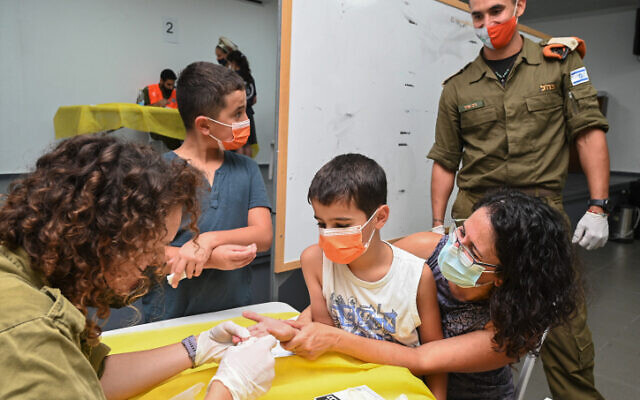More than 9,800 Israelis tested positive for COVID-19 on Monday, near an all-time high of new daily cases since the start of the pandemic. The positivity rate of all those tested on Monday stood at 6.63%, which has not been seen since February.
A total of more than 1 million Israelis have tested positive for COVID since the outbreak began in early 2020, with new figures being released on Tuesday morning.
During the peak of the third wave in mid-January, more than 10,000 cases were reported a day, but the figure has not been replicated since then. On August 16, 8,772 new COVID cases were reported, which was the highest single-day figure in the fourth wave so far.
As of Tuesday morning, Israel had 72,572 active COVID cases, with 1,124 people hospitalized, 678 in critical condition and 123 of them on ventilators. Of the 141,472 COVID tests conducted on Monday, 9,831 came back positive.
The ministry said that 12 people died on Monday and 30 on Sunday.
Despite a widespread and long-running government campaign, more than 1 million eligible Israelis have yet to receive a COVID-19 vaccine.
According to data released by the health ministry on Monday, around 1,080,000 people who have not received any dose of the vaccine are likely to be in the age group of 12-39 and come from disadvantaged backgrounds.

Israel queues to receive a COVID-19 vaccine at a Magen David Adom mobile vaccine unit in the city of Kafr Qasim on August 23, 2021. (Yossi Aloni / Flash 90)
According to the ministry, 31% of them are from the Arab population and 16% are from the Haredi community. Therefore, both Arab and Haredim are over-represented in the population of vaccine refusers, as they represent approximately 21% and 12% of the total population, respectively.
Overall, older Israelis are most likely to be vaccinated, with more than 90% of people over the age of 60 having received two doses of the Pfizer COVID vaccine. Meanwhile, only 29% of people aged 12-15 have been fully vaccinated, and 69% of 16- to 19-year-olds have been fully vaccinated.
According to the Ministry of Health, parents who refuse to vaccinate their teens are less likely to be educated, and more likely to have below average income, than those who are between 34 and 45 years old. and they live in Jerusalem or the South. . The reasons why parents did not vaccinate their children in the general population were the following: 24% worried about side effects, 17% said not enough is known about the long-term effects of vaccines and 13% said that the virus Children are not dangerous.
Among the Arab population, the ministry reported, the Bedouin community is the least vaccinated and has the least access to vaccination centres. Of parents in the Arab community who did not vaccinate their children, 19% said they were concerned about the long-term effects of the vaccine and 19% said they lack confidence in its effectiveness.

IDF officers and soldiers of the Home Front Command conduct serological tests for antibodies in children aged 3 to 12 years at Katzrin in the Golan Heights on August 22, 2021. (Michael Gilady/Flash 90)
And in the Haredi population, the majority of parents who have refused to vaccinate their children – 34.4% – believe they already have the coronavirus and are therefore naturally protected.
As Israel prepares to reopen schools nationwide on September 1, about 37,000 teachers and education staff have yet to be vaccinated. Channel 12 reported that teachers who have not been vaccinated will have to submit a negative COVID test every 72 hours, and pay for the tests themselves and conduct them at their own free time.
According to the Cannes public broadcaster, school workers who refuse vaccination or testing will be denied entry to school and placed on unpaid leave.